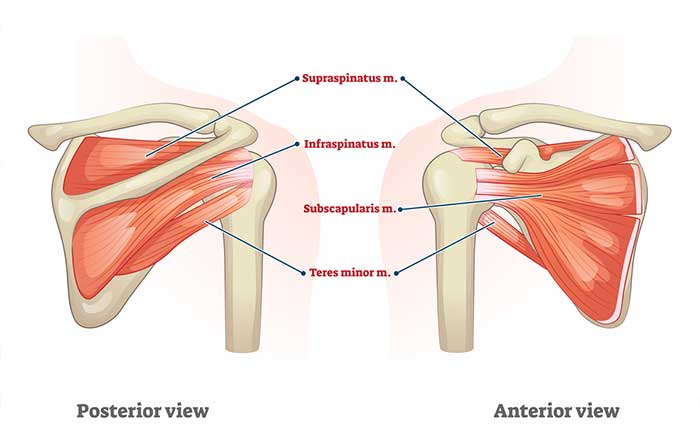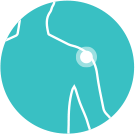Rotator Cuff Tear
A rotator cuff tear is a common injury that occurs when one or more of the tendons in the rotator cuff become damaged or torn. They can be either partial or full-thickness, depending on the extent of the damage. In a partial tear, the tendon is damaged but not completely torn through, while a full-thickness tear means the tear extends completely through the tendon.
What is the Rotator Cuff?
The rotator cuff is made up of a group of four muscles that play a pivotal role in shoulder function and stability: the supraspinatus, infraspinatus, teres minor, and subscapularis. These muscles, along with their associated tendons, create a protective “cuff” around the head of the humerus, keeping it securely nestled within the shallow socket of the shoulder joint. This provides crucial stability to the shoulder and enables a wide range of movements necessary for everyday activities.

Causes
Tears can occur due to various factors, each contributing to the wear and tear of the delicate rotator cuff tendons. Factors that can lead to this painful and limiting condition can range from:
- Repetitive Overuse: Engaging in activities that involve repetitive overhead motions, such as throwing, swimming, or lifting heavy weights, can place significant stress on the rotator cuff tendons, leading to wear and tear over time.
- Trauma or Acute Shoulder Injury: A sudden force or impact to the shoulder, such as a fall or a direct blow, can cause an acute tear in the rotator cuff tendons.
- Age-Related Degeneration: As people age, the blood supply to the rotator cuff tendons may diminish, making them more susceptible to degeneration and tears. Chronic wear and tear and bone spurs can also lead to rotator cuff tears.
- Poor Posture and Muscle Imbalances: Incorrect posture and muscle imbalances around the shoulder can place additional stress on the rotator cuff tendons, increasing the risk of tears.
Signs and Symptoms
Recognising the signs and symptoms of rotator cuff tears is crucial for early detection and proper management. Here are the common indications to look out for:
- Persistent shoulder pain, particularly during arm movements, lifting, or reaching overhead.
- Weakness in the affected shoulder, making everyday tasks that require arm strength more challenging.
- Limited range of motion in the shoulder, difficulty in performing movements like reaching behind the back or combing hair.
- Pain or discomfort during specific shoulder movements during physical examination.
- Some patients may describe a clicking or popping sensation in the shoulder during certain activities.
Being aware of these signs allows for timely intervention and better outcomes in treating rotator cuff tears. If you experience any of these symptoms, it is essential to seek medical attention for proper evaluation and personalised care.
Diagnosis
Mr Soong Chua will begin with your medical history and a physical examination to assess pain and range of movement. Imaging tests such as x-rays, ultrasound or an MRI scan may also be carried out to assess further damage.
What are the Rotator Cuff Tear Treatment Options?
Treatment options for a rotator cuff tear depend on the size, location, and severity of the tear, as well as the patient’s age, activity level, and overall health. With the correct approach, rotator cuff pain may be considerably mitigated.
Mr Chua will consider a range of treatment options, including the following non-invasive treatments:
- Rest and/or activity modification
- Physical therapy
- Pain management using non-steroidal anti-inflammatory medication (such as ibuprofen)
- Steroid injection to reduce inflammation and provide temporary relief from pain.
Rotator Cuff Surgery
If non-invasive treatments are ineffective or insufficient for your situation, Mr Soong Chua may recommend surgery.
Rotator Cuff Graft/Patch Augmentation
When there is a partial rotator cuff tear that is symptomatic and not responding to conservative treatment, or a tear where the tendon quality is poor, it is sometimes necessary to consider a collagen patch to augment the repair.





